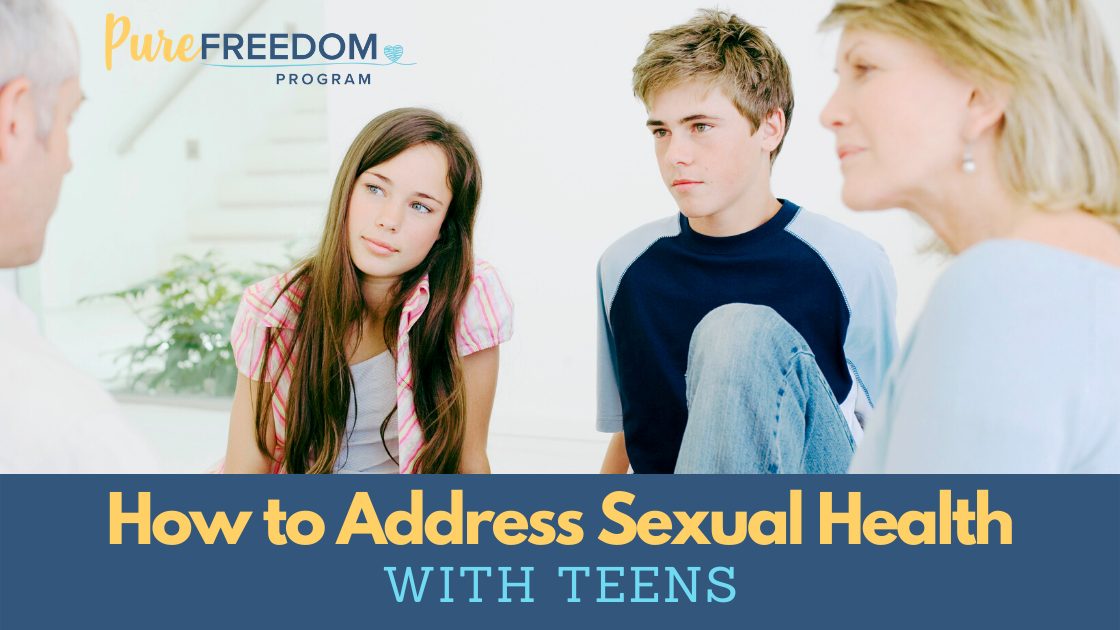16 Nov, 2021

There’s hardly any parent in this world who doesn’t dread having “the talk” with their son or daughter. The same can be said about teachers who are sometimes tasked with tackling sexual health in class. So the question often follows: “how do I talk about sexual health with my students”? Before we get to that part, let’s first discuss the “why”. Why should adults address sexual health with teens? Is it really necessary?
As sexual risk avoidance experts traveling to over 20 counties in Northeast Missouri, we hear firsthand many students’ experiences. This is what we have learned from them:
- Teens have access to more information than ever before, mainly online. They spend an average of 7 hours per day looking at a screen.
- Almost half of the teens prefer to ask their questions to Google instead of a parent or another trusted adult. Turning to Google feels less uncomfortable and intimidating to them.
- However, not every source of information is evidence-based. Despite having all this information at their fingertips, teenagers may have misconceptions about relationships and sexual health.
- For instance, they may not understand how to distinguish a healthy relationship from a toxic one. In addition, they often have a hard time understanding how their present decisions affect their future.
- Yet, teens value their parents’ perspective. They are likely to adopt the values and principles that they learn from them, especially if they know that they care deeply about them.
- This means that adults can have a tremendous positive impact on their teens’ sexual health and well-being. According to several studies, “teens who report talking with their parents about sex are more likely to delay having sex.”
If this motivates you to speak up, here are 7 tips on how to address sexual health with your student(s):
Tips to prepare for the conversation:
- Foster an atmosphere of trust. This will help them feel more comfortable talking to you about this personal topic. To establish an atmosphere of trust, you might want to share your own experiences first, let them know you are always there to help or answer questions, as well as refrain from judgement.
- Stay informed about the latest trends and slang. You will be able to relate to your students more if you understand where they are coming from, what they are watching, listening, reading, and so on. Some of their vocabulary may also be unfamiliar to you. Therefore, don’t hesitate to ask for clarification when in doubt. To give an example, the expression “talking to someone” can mean that two people are interested in one another and are about to date. The Teen Culture Translator newsletter from Axis is a good resource for you to become more acquainted with all these terms and trends.
- Learn about sensitive topics and be ready to answer questions. You don’t have to become an expert on topics such as puberty, relationships, and sex, but you may want to learn a little bit about them. This way you will be able to answer any general questions you get. In addition, know the signs of a toxic or abusive relationship and always stay on high alert. Know what to do if a student comes to you with a complaint.
During the conversation:
- Admit what you don’t know. Young people love honesty. Admitting that you are not familiar with something gives you the opportunity to look for the answer together.
- Listen carefully. Teenagers tend to be just as intimated as you are and don’t always ask questions directly. Pay attention to clues dropped in daily conversations that could indicate they are ready to date, have their first sexual experience, or that they are just curious about sex.
- When talking about sex, ask them what they already know. This will allow you to not only evaluate how much they know, what they are interested in, but also to correct any misconceptions they may have.
After the conversation:
- Pay attention to daily events or situations that may prompt more conversations. Talking about relationships and sexual health shouldn’t happen in one setting. Be aware that you may bring the subject in daily situations and in a more relaxed way. Movies, TV shows, books, or even daily events may all give you the opportunity to engage with your students.
- Help them gain self-confidence, especially girls. Research shows that girls who have lower self-confidence are more likely to have sex early. This in turn can result in lower satisfaction, self-esteem, and higher anxiety. Reassure them by highlighting their value and telling them that the boy they choose should recognize it too.
- Invite a program such as Pure Freedom to come teach in your classroom or youth group. Pure Freedom has been teaching youth about sexual health and sexual risk avoidance since 2013. The topics we cover include:
– Healthy friendships and dating relationships
– Body literacy in relation to puberty and anatomy
– Pregnancy and fetal development
– Making healthy choices regarding sexuality
– STIs prevention and contraception
– Preventing sexual abuse
– Setting goals for the future
You got it! Remember that you are not alone in this and that you have many resources available out there. Pure Freedom is one of them. If you would like to sign up for our monthly newsletter and receive information on our future workshops, fill out our contact form!
Written by Elodie Takamiya.
Resources:
https://abcnews.go.com/US/teens-spend-hours-screens-entertainment-day-report/story?id=66607555
https://www.cdc.gov/healthyyouth/protective/factsheets/talking_teens.htm
Teen Culture Translator newsletter from Axis
https://www.verywellmind.com/teen-self-esteem-and-risky-sexual-behavior-1065482